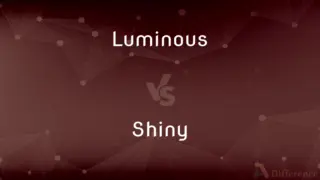Lightness vs. Darkness — What's the Difference?
Edited by Tayyaba Rehman — By Fiza Rafique — Updated on May 8, 2024
Lightness represents illumination and visibility, typically associated with positivity and clarity, whereas darkness denotes the absence of light, often linked with obscurity and potential unease.

Difference Between Lightness and Darkness
Table of Contents
ADVERTISEMENT
Key Differences
Lightness is characterized by the presence of light, which makes vision possible and is often symbolically linked to knowledge and purity. Darkness, on the other hand, results from the absence of light and is frequently associated with mystery or fear.
In photography and art, lightness is used to bring attention to details, create emphasis, and convey a sense of openness. Darkness, meanwhile, can add depth, contrast, and emotional intensity to an image.
Lightness is typically associated with safety and clarity, making environments feel welcoming and secure. Darkness can invoke a sense of unknown, sometimes leading to feelings of isolation or apprehension.
Many societies celebrate lightness in festivals and ceremonies, symbolizing hope and renewal. Darkness, while sometimes viewed negatively, is also celebrated in some contexts as a time for rest and reflection.
In terms of physics, lightness is a result of light particles (photons) hitting surfaces and reflecting back to the eye. Darkness is simply a condition where there is little to no light reflecting back to the observer.
ADVERTISEMENT
Comparison Chart
Definition
The state of being well-lit or having lots of light.
The absence or lack of light.
Symbolism
Often represents purity, goodness, and safety.
Commonly associated with mystery and danger.
Use in Arts
Used to highlight, clarify and emphasize elements.
Used to add depth, enhance contrast, and mood.
Psychological Impact
Generally evokes feelings of happiness and security.
May evoke fear, mystery, or calm, depending on context.
Physical Presence
Caused by the presence of photons.
Caused by the absence of sufficient photons.
Compare with Definitions
Lightness
A measure of how light or pale something appears.
Adjusting the lightness slider can change the mood of a photograph.
Darkness
A color or shade that is close to black or without brightness.
He preferred the darkness of the room for meditating.
Lightness
Relative lack of weight or density.
The lightness of the fabric makes it ideal for summer clothes.
Darkness
A state of ignorance or unawareness, often used metaphorically.
They lived in darkness about the realities of the world.
Lightness
The quality or state of being light, especially in terms of color or luminosity.
The lightness of the room made it perfect for painting.
Darkness
The state or quality of being dark, lacking light or brightness.
The darkness of the night sky was perfect for stargazing.
Lightness
The condition of being illuminated or full of light.
The morning lightness cheered everyone’s mood.
Darkness
The absence of light, especially in a particular area or place.
The power outage plunged the city into darkness.
Lightness
Lightness is a visual perception of the luminance ( L ) {\displaystyle (L)} of an object. It is often judged relative to a similarly lit object.
Darkness
Symbolic of evil, mystery, or fear.
The story explored themes of darkness and redemption.
Lightness
The quality or condition of being illuminated.
Darkness
Darkness, the polar opposite of brightness, is understood as a lack of illumination or an absence of visible light. Human vision is unable to distinguish color in conditions of either high brightness or very low brightness.
Lightness
The dimension of the color of an object by which the object appears to reflect or transmit more or less of the incident light, varying from black to white for surface colors and from black to colorless for transparent volume colors.
Darkness
Lacking or having very little light
A dark corner.
Lightness
The state or quality of having little weight or force.
Darkness
Lacking brightness
A dark day.
Lightness
Ease or quickness of movement; agility.
Darkness
Reflecting only a small fraction of incident light; tending toward black
Dark clothing.
Lightness
Ease or cheerfulness in manner or style.
Darkness
Served without milk or cream
Dark coffee.
Lightness
Freedom from worry or trouble.
Darkness
Being or having a complexion that is not light in color.
Lightness
Lack of appropriate seriousness; levity.
Darkness
Sullen or threatening
A dark scowl.
Lightness
Delicacy or subtlety in craft, performance, or effect.
Darkness
Characterized by gloom or pessimism; dismal or bleak
A dark day for the economy.
Dark predictions of what lies in store.
Lightness
(uncountable) the condition of being illuminated
Darkness
Being or characterized by morbid or grimly satiric humor.
Lightness
(uncountable) the relative whiteness or transparency of a colour
Darkness
Unknown or concealed; mysterious
A dark secret.
The dark workings of the unconscious.
Lightness
(countable) The product of being illuminated.
Darkness
Lacking enlightenment, knowledge, or culture
A dark age in the history of education.
Lightness
The state of having little (or less) weight, or little force.
Darkness
Evil in nature or effect; sinister
"churned up dark undercurrents of ethnic and religious hostility" (Peter Maas).
Lightness
Agility of movement.
Darkness
Morally corrupt; vicious
Dark deeds.
A dark past.
Lightness
Freedom from worry.
Darkness
Having richness or depth
A dark, melancholy vocal tone.
Lightness
Levity, frivolity; inconsistency.
Darkness
Not giving performances; closed
The movie theater is dark on Mondays.
Lightness
The state, condition, or quality, of being light or not heavy; buoyancy; levity; fickleness; nimbleness; delicacy; grace.
Darkness
(Linguistics) Pronounced with the back of the tongue raised toward the velum. Used of the sound (l) in words like full.
Lightness
Illumination, or degree of illumination; as, the lightness of a room.
Darkness
Absence of light.
Lightness
Absence of depth or of duskiness in color; as, the lightness of a tint; lightness of complexion.
Darkness
A place having little or no light.
Lightness
The property of being comparatively small in weight;
The lightness of balsa wood
Darkness
Night; nightfall
Home before dark.
Lightness
The gracefulness of a person or animal that is quick and nimble
Darkness
A deep hue or color.
Lightness
Having a light color
Darkness
Darks Pieces of laundry having a dark color.
Darkness
(uncountable) The state of being dark; lack of light; the absolute or comparative absence of light.
The darkness of the room made it difficult to see.
Darkness
(uncountable) The state or quality of reflecting little light, of tending to a blackish or brownish color.
The darkness of her skin betrayed her Mediterranean heritage.
Darkness
(uncountable) Gloom; gloominess; depression.
Darkness
(countable) The product of being dark.
Darkness
(uncountable) Lack of understanding or compassion; spiritual or mental blindness.
Darkness
(uncountable) Secrecy; concealment.
Darkness
(uncountable) Lack of knowledge; obscurity or meaning or intelligibility; the unknown.
Darkness
(uncountable) Hell.
Darkness
The absence of light; blackness; obscurity; gloom.
And darkness was upon the face of the deep.
Darkness
A state of privacy; secrecy.
What I tell you in darkness, that speak ye in light.
Darkness
A state of ignorance or error, especially on moral or religious subjects; hence, wickedness; impurity.
Men loved darkness rather than light, because their deeds were evil.
Pursue these sons of darkness: drive them outFrom all heaven's bounds.
Darkness
Want of clearness or perspicuity; obscurity; as, the darkness of a subject, or of a discussion.
Darkness
A state of distress or trouble.
A day of clouds and of thick darkness.
Darkness
Absence of light or illumination
Darkness
An unilluminated area;
He moved off into the darkness
Darkness
Absence of moral or spiritual values;
The powers of darkness
Darkness
An unenlightened state;
He was in the dark concerning their intentions
His lectures dispelled the darkness
Darkness
Having a dark or somber color
Darkness
A swarthy complexion
Common Curiosities
Can darkness be beneficial?
Yes, darkness can aid in sleep, provide relief from overstimulation, and foster contemplation.
What is the role of lightness in visual arts?
Lightness can define forms, create spatial illusions, and influence the emotional impact of art.
How does darkness affect mood in film?
Darkness can create a sense of foreboding, mystery, or intensity in film.
Is darkness always associated with negativity?
Not always; darkness can also symbolize rest, tranquility, and the unknown.
What practical applications does lightness have in design?
Lightness can make spaces feel larger and more open, and can be used to attract attention to specific design elements.
What metaphors are commonly used with darkness?
Darkness is often used metaphorically to describe periods of depression or ignorance.
What does lightness symbolize in literature?
In literature, lightness often symbolizes hope, renewal, or enlightenment.
How do children typically react to darkness?
Many children may feel fearful or anxious in the dark due to its association with the unknown.
What psychological techniques utilize darkness?
Techniques like sensory deprivation use darkness to promote deep relaxation or meditation.
How do lightness and darkness affect photography?
They affect exposure, mood, and the perception of depth and detail in photography.
Why do people generally prefer lightness?
People often associate lightness with visibility, safety, and positivity, making it generally more preferred.
What cultural events celebrate lightness?
Festivals like Diwali and Lantern Festival celebrate lightness and its symbolic meanings.
What is a common misconception about darkness?
A common misconception is that darkness is a physical substance, whereas it is simply the absence of light.
How does the absence of light physically create darkness?
Darkness occurs physically when no photons are available to be captured by the eye.
Can darkness improve health in any way?
Yes, darkness can promote melatonin production, which improves sleep quality.
Share Your Discovery

Previous Comparison
Mrigal vs. Rohu
Next Comparison
Luminous vs. ShinyAuthor Spotlight
Written by
Fiza RafiqueFiza Rafique is a skilled content writer at AskDifference.com, where she meticulously refines and enhances written pieces. Drawing from her vast editorial expertise, Fiza ensures clarity, accuracy, and precision in every article. Passionate about language, she continually seeks to elevate the quality of content for readers worldwide.
Edited by
Tayyaba RehmanTayyaba Rehman is a distinguished writer, currently serving as a primary contributor to askdifference.com. As a researcher in semantics and etymology, Tayyaba's passion for the complexity of languages and their distinctions has found a perfect home on the platform. Tayyaba delves into the intricacies of language, distinguishing between commonly confused words and phrases, thereby providing clarity for readers worldwide.












































